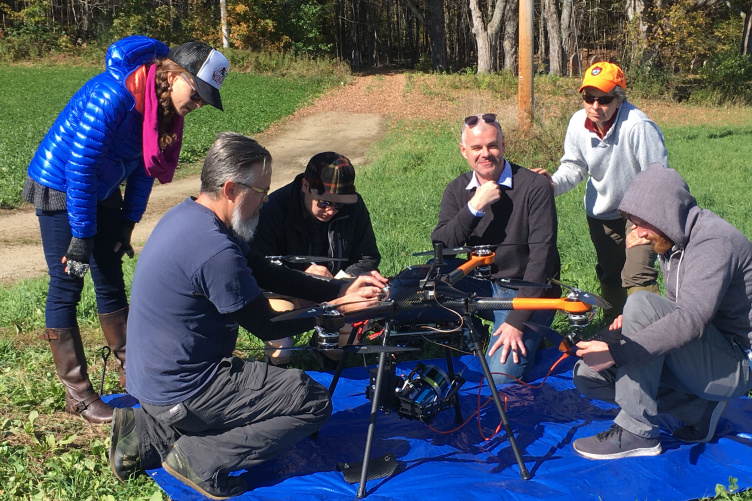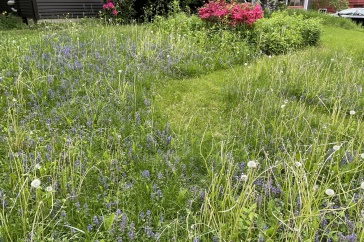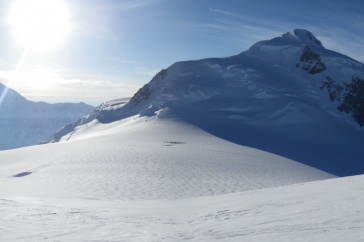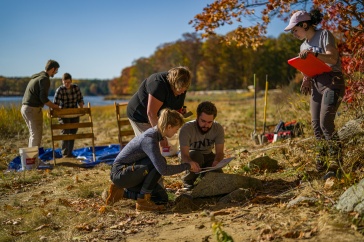
Jennifer Jacobs (wearing an orange hat) is collaborating on research with her new colleagues in the Earth Systems Research Center.
Jennifer Jacobs is passionate about bringing people together to tackle the big issues affecting communities— from our water supply to our roadways, she’s helping to advance the conversation about how a changing climate affects critical infrastructure.
Jacobs, professor of civil and environmental engineering, embodies the spirit of collaboration. She recently joined the Earth Systems Research Center (ESRC), one of five centers comprising the university’s Institute for the Study of Earth, Oceans, and Space (EOS). She brings with her a five-person research group composed of graduate students, postdoctoral students and a research engineer, all of whom focus on the nexus of civil engineering, climate change, and water resources. The interdisciplinary approach to her work aligns well with the EOS mission of bringing together high-level research expertise on convergent topics.
“I came to UNH in 2003 as part of the environmental resource group,” Jacobs explains, “but EOS is my natural home.” Despite having just moved her office into Morse Hall, Jacobs is already collaborating with ESRC colleagues on areas of research overlap. She’s currently working with Ruth Varner, director for the ESRC, to find support for a cohort of Ph.D. students to work on challenges from the changing Arctic and impacts on the lower 48.
“Here in EOS, there are so many world-class collaborators just a few doors away and amazing opportunities to work together to better understand the Earth and the human footprint.”
On the national scale, Jacobs currently leads the Infrastructure and Climate Network, an NSF-funded group tasked with identifying current challenges to roads and infrastructure due to climate-related threats. Her contributions to the National Climate Assessment made headlines late last year, and she continues to collaborate with New Hampshire’s coastal communities to help them identify the impacts of sea-level rise and groundwater rise on their roads, septic systems and other crucial infrastructure. She’s currently working to estimate the cost of traffic delays due to flooded roads all along the Eastern Seaboard and communicate the potential professional liability of not addressing current and future impacts.
Climate change is affecting more than just coastal infrastructure — Jacobs’ work with winter logging roads in the northern part of the state has revealed that more freeze-thaw cycles are happening in mid-winter, which impacts the loggers’ ability to drive on those roads. “It breaks the roads apart and causes real headaches for those whose livelihoods depend on winter road access for logging,” she explains.
Although Jacobs may be best known for her climate and infrastructure research, she spends a good deal of time conducting research on water resources and snow pack using remote sensing techniques to estimate snow quantity. This is particularly useful in places that are prone to snowmelt floods or where the amount of mountain snowpack influences the water supply and agricultural irrigation, she says. By studying the amount of snow in surrounding locations and estimating when the melt will occur, Jacobs helps agencies like the U.S. Department of Defense and NOAA’s River Forecast Centers by developing remote sensing products they can use to better prepare for flood events and to manages reservoirs.
Closer to home, Jacobs notes that she doesn’t have to go too far to expand her research portfolio.
“Here in EOS, there are so many world-class collaborators just a few doors away and amazing opportunities to work together to better understand the Earth and the human footprint,” she says.
Learn more about the Institute for the Study of Earth, Oceans, and Space.
-
Written By:
Rebecca Irelan | Institute for the Study of Earth, Oceans, and Space | rebecca.irelan@unh.edu | 603-862-0990



















































